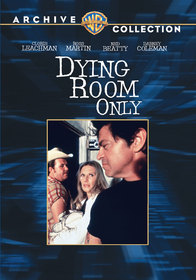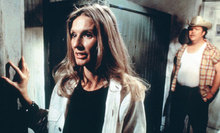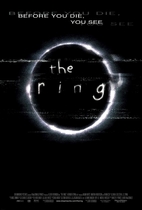Our editor-in-chief Nate Yapp is proud to have contributed to the new book Hidden Horror: A Celebration of 101 Underrated and Overlooked Fright Flicks, edited by Aaron Christensen. Another contributors include Anthony Timpone, B.J. Colangelo, Dave Alexander, Classic-Horror.com's own Robert C. Ring and John W. Bowen. Pick up a copy today from Amazon.com!
Dying Room Only (1973)
The 1973 television movie Dying Room Only concerns itself with the tensions between the modern suburb dweller and those who make their living along the highways that run between "civilized" places. Writer Richard Matheson tackled similar subject matter in 1971's Duel, where he explored the conflict between a salesman and a faceless, homicidal truck driver. Here, he moves off-road to a diner to examine who, exactly, makes the rules out in the middle of nowhere.
On their way home from a long road trip, Bob and Jean Mitchell (Dabney Coleman and Cloris Leachman) stop for a bite to eat at the Arroyo Diner and Motel. Jean uses the restroom to freshen up, but when she emerges, Bob is no longer at their table. In fact, he seems to have vanished from the diner entirely. Jim (Ross Cutler), the cook, and Tom (Ned Beatty), the only other customer, insist that they don't know where her husband went. With no evidence of foul play, the local sheriff (Dana Elcar) can't help; Jean, stranded and desperate, is left to find Bob on her own.
The scenario -- two people on vacation, one disappearing without a trace, the other struggling to discover what happened -- is an old one. Alfred Hitchcock tackled it in The Lady Vanishes, as did Terence Fisher in So Long at the Fair. More recent examples include Jonathan Mostow's Breakdown and Robert Schwentke's Flightplan. Dying Room Only is more geared toward horror than its cinematic cousins in that it isolates its protagonist from the rest of the world, pitting her against antisocial locals who may have done away with her husband.
From the earliest scenes in the film, Jean's relationship with her husband is defined by argument; they have just lost several hours of travel time on an errand that Bob believes to be frivolous. However, we're given to believe that this particular tension is atypical, the result of road nerves toward the end of their vacation. The antagonism between the couple becomes important once Bob disappears for two reasons. First, when someone drives off in the Mitchell's station wagon, it plants a reasonable doubt that maybe Bob just left in a huff, allowing the sheriff to dismiss Jean's accusations as hysteria. Second, it gives an additional layer of complexity to Jean's drive to find Bob, one of guilt for letting what might have been her last conversation with her husband be an argument.
Blocking Jean's quest at every turn are Jim, Tom, and Vi (Louise Latham), the motel clerk. However, their methods are subtle, difficult to prove as malicious, and as a result, tremendously frustrating. Each member of this trio has certain a demeanor that doesn't break – Jim is impatient, Tom jocular, and Vi ambivalent. When Jean needs to make a long-distance call, Vi's sour refusal can be put down to laziness and Tom's sudden need to use the diner pay phone to call home could be seen as a case of bad timing; he only hints at an ulterior motive through his knowing smirk. Jim meets Jean's every with a variation on, “Lady, I'm busy.” The message all three project is clear: you are an outsider, an interloper in our lives – go away and let us do as we will.
Matheson defines the central conflict in a monologue delivered by one of the kidnappers during Dying Room Only's climax. “This is our territory out here. You folks come here... This is my place. You have something I want, I take it, see? I just take it. That's all. Just take it.“ Out in the barren wastes of Arizona, who's to argue with him? The sheriff admits that Bob's isn't the first unsolved disappearance in the area; his defeated tone suggests that it's just one of those things, nothing to be done for it. This band of crooks may not be educated, but they're smart – they know the extent of the law's capabilities and how to exploit the shortcomings.
If, then, the success of this plot is dependent on the rule of law and the reasonable attitudes that define their suburban victims, the only way to defeat the criminals is to transgress the rules and be unreasonable. Jean's early requests for help from Jim and Tom are quiet and mannered, but as it becomes increasingly clear that they won't help her, she asserts herself more strongly, even banging the diner counter loudly to draw Jim's attention. Once it becomes clear that the sheriff won't be any help, she investigates outside of the bounds of the law, sneaking around the motel, rummaging through the diner's backroom, and eavesdropping (unsuccessfully) on conversations. Later, she resorts to violence, swinging a two-by-four at a would-be assailant; she tells the sheriff, “I hope I killed him.”
Dying Room Only's major failing is that it doesn't allow Jean full agency to resolve the situation on her own. Her victory is snatched away from her by the timely intervention of the police on two occasions. While her search is vindicated, the film itself loses focus; we're invested in Jean's ability to overcome the odds of her predicament, not the law's belated competence on the job. As a result, the climax isn't as involving as it should be.
Available on DVD for the first time through Warner Archive, Dying Room Only is a smart thriller with a tense central mystery. Using a classic narrative trope to explore a class conflict in the Arizona desert, Matheson creates a worthy companion piece to Duel and one that comes highly recommended.










It's Dana Elcar (not
It's Dana Elcar (not "Eclar").
An excellent lesson in why
An excellent lesson in why one shouldn't review hungry. Corrected now, thanks.
"He went for a little walk! You should have seen his face!"